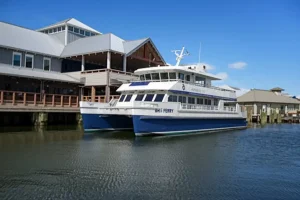If you’ve recently heard talk about a new court opinion affecting Bald Head Island, you’re not alone. News travels fast here—even  when we have to take a ferry to get anywhere else.
when we have to take a ferry to get anywhere else.
With no bridge and minimal car use, the ferry service is our community’s backbone, connecting you to mainland grocery stores, medical appointments, and everyday errands.
You might be thinking: “They said there’s a new court ruling that changes how the ferry operates. Does that mean higher fares, fewer trips, or less say for islanders?”
The short answer: The recent North Carolina court opinion actually reaffirms that the ferry and certain related operations are considered regulated public utilities.
That’s a good thing for most residents.
It means the people running the ferry don’t have free rein to suddenly hike prices, cut back runs, or ignore local concerns. Instead, they have to play by rules designed to ensure fairness and accountability.
If you searched online about this court decision and landed here, we’re going to break down what happened, why it matters, and how it could shape your life on Bald Head Island.
Whether you’re a longtime homeowner or just someone who enjoys splitting your time between the island and the mainland, understanding these changes can give you peace of mind.
Quick Look for the Busy Reader: What the Opinion Says
- BHI Ferry Service: The ferry itself is undeniably a regulated public utility. That part’s straightforward and not new. The ferry has long been subject to the oversight of the North Carolina Utilities Commission, meaning fare changes, schedules, and other aspects of ferry operations are subject to Commission approval.
- Parking Lots: The parking operation on the mainland side was a big part of the recent legal dispute. The core question: Are these parking facilities so tied to the ferry service that they effectively become part of the regulated utility? The opinion concluded that yes, the parking lots are integral. Because the ferry relies on these parking facilities and they significantly affect the ferry’s rates and service, the parking operations also fall under regulatory scrutiny. In other words, changes to the parking lots—such as a sale or major price hike—can’t just happen without Utilities Commission oversight, since they’re considered “ancillary” to the ferry’s regulated service.
- Barge Operations: The barge service—used for transporting freight, materials, and in some cases vehicles—was also at issue. Unlike the parking facilities, the court found that the barge operation did not meet the same criteria for regulation as part of the ferry utility. The evidence didn’t show that the barge’s operations directly affect the ferry’s regulated rates or overall service in a way that made them inseparable. As a result, the barge operations are not subject to the same level of regulatory oversight as the ferry and the connected parking lots.
In Summary:
The Opinion is not just about the ferry doing whatever it wants. The ferry has been regulated before and continues to be. The key new development involves the parking facilities. The court decided that those parking operations, because of their close connection to the ferry service and their impact on ferry rates and user experience, are now also considered part of the regulated utility structure. On the other hand, the barge operation was not pulled under that same regulatory umbrella.
If the earlier explanation seemed to focus heavily on the ferry’s regulated status, it’s because that’s central to why the parking lots matter. The parking dispute is what brought the case to a head. Without the ferry being a regulated utility, whether the parking lots were part of that regulated system wouldn’t matter. The court’s decision confirms that both the ferry and its linked mainland parking lots (but not the barge) remain subject to Utilities Commission review and approval for significant changes.
Why Was This BHI Opinion Needed?
Bald Head Island’s uniqueness is its charm—and its challenge. With no cars (except service vehicles) and the mainland accessible only by boat, residents rely on the ferry like a lifeline.
Rumors or worries about changes—such as selling off parts of the ferry operation or the parking facilities—made many people nervous. If control shifted to a less regulated environment, what would stop the new operators from raising ticket prices steeply or reducing the number of ferry trips?
The recent court opinion clarifies this point.
It states that because the ferry and its related operations play such a critical role in daily island life, they can’t be treated like just another private venture.
This matters because without such a ruling, essential parts of the travel system might have been sold or altered without meaningful oversight. Now, the community can breathe a little easier knowing there are guardrails in place.
Being a Regulated Public Utility—What Does That Mean in Practice?
Regulated status means the ferry operator must adhere to guidelines set forth by the North Carolina Utilities Commission.
If the ferry company wants to raise ticket prices, for example, they generally have to show why. Is the increase necessary to cover maintenance costs, improve safety, or add more boats? The Commission reviews these proposals and determines whether they’re fair.
The same goes for changes in the ferry schedule.
Any move to cut back on trips—or to rearrange departure times in a way that inconveniences residents—could face pushback. The Commission can hold hearings, consider public comments, and possibly direct the ferry operator to maintain or adjust services to better meet community needs.
How the Court Opinion Helps Bald Head Island Residents
Before this ruling, some islanders might have felt uneasy about the future.
Could the ferry operation be sold piecemeal? Could the parking lot you rely on each time you head to the mainland suddenly charge sky-high fees?
The court opinion makes it clear that parking operations closely tied to the ferry are also part of the regulated picture.
That means if there’s a scheme to sell or change the parking setup that people depend on to access the ferry, it can’t happen under the radar. The Utilities Commission’s involvement ensures that changes can’t just blindside the community.
This level of oversight aims to keep the ferry operations stable, dependable, and fairly priced.
You might still see changes over time—infrastructure upgrades, new boats, maybe even long-term schedule modifications—but these changes won’t come out of left field without a checks-and-balances system.
Accountability: Your Voice Matters
One often-overlooked benefit of the ferry’s regulated status, recently reinforced by the court, is your ability to have a say.
North Carolina’s system encourages public input.
If the ferry operator proposes a substantial fare hike, the Utilities Commission might schedule a hearing or invite written comments.
That means you can speak up, share your experiences, and explain how a change would affect daily life on the island – Bill Powers, Lawyer & Lover of Bald Head Island
It’s not just price hikes that can face scrutiny.
If, for instance, the ferry cut back on evening runs and you find yourself struggling to return home after a late mainland errand, you have a forum to raise your concerns.
The Commission can investigate whether those schedule changes are justified. Knowing you have a place to go, an official channel to register complaints, can make a real difference in feeling empowered rather than at the mercy of business decisions.
Fewer Surprises, More Stability
The recent court opinion also supports long-term stability.
As the island evolves—if population changes, tourism patterns shift, or new infrastructure is developed—the ferry and related services must adapt responsibly.
Being a regulated utility means the operator can’t just charge more for the same (or reduced) level of service.
If passenger loads increase dramatically, they may need to add more ferry runs or improve docking facilities, all under the watchful eye of the Commission and the community’s input.
This approach is intended to help prevent unpleasant surprises.
Instead of waking up one day to discover your ferry trip now costs double, you’ll likely see proposals well in advance.
You can expect a structured debate on the reasons behind changes, and an assurance that decisions aren’t made in a vacuum.
The Bigger Picture—Community Well-Being
At its core, the ferry isn’t just a transportation service; it’s part of the island’s DNA.
The court’s affirmation of the ferry’s regulated status reinforces that the public interest matters. It acknowledges that Bald Head Island’s ferry is more than a business transaction. It’s a daily necessity for residents who treasure the island’s quieter pace, limited automobile use, and strong sense of community.
When the court steps in to clarify these legal standings, it’s not to micromanage the ferry operator.
Rather, it’s to maintain a fair environment where residents are protected from arbitrary decisions. The ferry operator can still make a profit and run a sustainable enterprise, but not at the expense of the island community’s well-being.
Life on Bald Head Island After the Court Opinion
For most people, life might not feel dramatically different the day after the ruling.
You’ll still park, board, and ride the ferry much as you did before. But what’s changed is the underpinning legal clarity – Bill Powers, Attorney at Law
Should future issues arise—like a proposed sale of parking areas tied to the ferry or a shift in ferry schedules—you’ll know there’s a regulatory framework that demands reasonableness and accountability.
This new clarity can also encourage improvement.
Maybe the ferry company decides to enhance customer service or invest in more eco-friendly ferry boats to appeal to regulators and the public. Or perhaps they fine-tune schedules based on community feedback. With a baseline of regulation, innovation and community satisfaction can work hand in hand.
Speaking of Local Needs—A Note on Golf Cart Accidents & Drunk Driving Wrecks
While this blog post focuses on the ferry and the recent court opinion, Bald Head Island is unique in so many ways.
One of those is the reliance on golf carts for getting around once you’re off the ferry. If you ever find yourself needing help with a local legal matter, like a golf cart accident, you might appreciate talking to someone who understands the island’s lifestyle and rules.
If you have questions about a golf cart accident or other legal concerns, you can call Bill Powers at 704-342-4357.
Bill is a part-time resident of Bald Head Island and appreciates the unique environment we all enjoy. Bill’s law firm might be based in Charlotte, but he has a passion helping friends and neighbors hurt in drunk driving accidents and golf cart accidents on Bald Head.
We have no problem filing a personal injury claim in Brunswick County and litigating drunk driving accidents on the Island. My law license is good throughout all of North Carolina – Bill Powers
Have questions? Check out our additional articles about accidents:
- Why did the insurance company deny my claim?
- Negligence is not an “accident”
- What if I was the passenger in a wreck?
- What is contributory negligence?
Embrace the Stability and Transparency
In the end, the recent Court of Appeals opinion should be welcome news for most Bald Head Island residents and property owners. It confirms that the ferry and closely related services aren’t just at the whim of market forces. Instead, they’re supervised in a way that values community input, ensures stability, and protects the island’s distinctive character.
If you searched online for what the new court opinion means for Bald Head Island and stumbled upon this post, now you have a clearer picture: The ferry remains regulated, accountable, and subject to fair pricing and scheduling reviews. That’s one less thing to worry about as you savor the natural beauty and close-knit community spirit that make this island so special.
 Carolina Criminal Defense & DUI Lawyer Updates
Carolina Criminal Defense & DUI Lawyer Updates